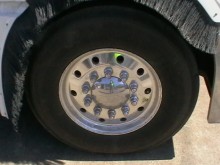An ineffective legal requirement to fit spray suppression devices on B-doubles has been removed under the Heavy Vehicle National Law (HVNL).
Spray suppression devices on B-Doubles were a requirement under previous individual state laws, except Western Australia and the Northern Territory.
However, the National Transport Commission (NTC) concluded on the basis of empirical evidence that the devices were not effective in real-world conditions at reducing the spray from B-doubles on wet roads. As a result, their requirement is not included in the HVNL.
B-double operators are no longer required to pay the initial costs to have their vehicle fitted with spray suppression nor the annual maintenance fees, saving the industry an estimated $186.2 million over 20 years.
The delivery of this reform through the new national law shows the government’s commitment to reducing inconsistencies and inefficiencies in Australia’s heavy vehicle industry.
Despite there being no requirement for spray suppression devices, operators are reminded that heavy vehicles still require mudguards. B-doubles registered under Federal Interstate Registration Scheme (FIRS) must still comply with the Commonwealth Interstate Road Transport Regulation 1986 which requires spray suppression devices to be fitted. Operators may also apply to their local registration authority for spray suppression exemptions for FIRS vehicles used on unsealed roads.


 Accessibility tools
Accessibility tools

